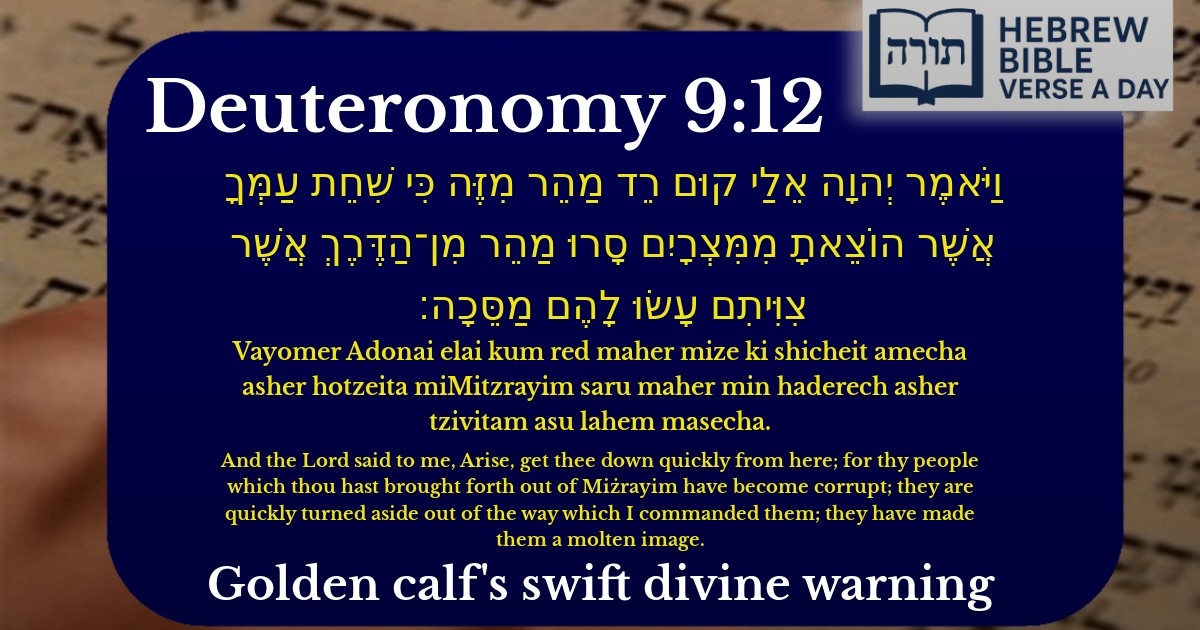Join Our Newsletter To Be Informed When New Videos Are Posted
Join the thousands of fellow Studends who rely on our videos to learn how to read the bible in Hebrew for free!
Hebrew Text
וַיֹּאמֶר יְהוָה אֵלַי קוּם רֵד מַהֵר מִזֶּה כִּי שִׁחֵת עַמְּךָ אֲשֶׁר הוֹצֵאתָ מִמִּצְרָיִם סָרוּ מַהֵר מִן־הַדֶּרֶךְ אֲשֶׁר צִוִּיתִם עָשׂוּ לָהֶם מַסֵּכָה׃
English Translation
And the Lord said to me, Arise, get thee down quickly from here; for thy people which thou hast brought forth out of Miżrayim have become corrupt; they are quickly turned aside out of the way which I commanded them; they have made them a molten image.
Transliteration
Vayomer Adonai elai kum red maher mize ki shicheit amecha asher hotzeita miMitzrayim saru maher min haderech asher tzivitam asu lahem masecha.
Hebrew Leining Text
וַיֹּ֨אמֶר יְהֹוָ֜ה אֵלַ֗י ק֣וּם רֵ֤ד מַהֵר֙ מִזֶּ֔ה כִּ֚י שִׁחֵ֣ת עַמְּךָ֔ אֲשֶׁ֥ר הוֹצֵ֖אתָ מִמִּצְרָ֑יִם סָ֣רוּ מַהֵ֗ר מִן־הַדֶּ֙רֶךְ֙ אֲשֶׁ֣ר צִוִּיתִ֔ם עָשׂ֥וּ לָהֶ֖ם מַסֵּכָֽה׃


Context of the Verse
This verse (Devarim 9:12) recounts Hashem's command to Moshe Rabbeinu to descend from Har Sinai after the Jewish people created the Golden Calf (עֵגֶל הַזָּהָב). The verse appears in Moshe's recounting of the events to Bnei Yisrael before entering Eretz Yisrael.
Rashi's Explanation
Rashi explains that the phrase "כִּי שִׁחֵת עַמְּךָ" ("for your people have become corrupt") emphasizes the severity of their sin. The term "שִׁחֵת" implies a complete moral corruption, as seen in Bereishit 6:12 regarding the generation of the Flood. Rashi also notes that Hashem refers to them as "עַמְּךָ" ("your people") rather than "My people," distancing Himself due to their transgression.
Rambam's Perspective
In Moreh Nevuchim (1:36), Rambam discusses how the Golden Calf represented a regression to idolatrous tendencies ingrained from their time in Mitzrayim. The phrase "סָרוּ מַהֵר מִן־הַדֶּרֶךְ" ("they quickly turned aside") highlights the fragility of their emunah despite witnessing miracles.
Midrashic Insights
Ibn Ezra's Commentary
Ibn Ezra notes the irony in "אֲשֶׁר הוֹצֵאתָ מִמִּצְרָיִם" ("which you brought out of Egypt"). Though Moshe was Hashem's agent, the people attributed their redemption to him, laying the groundwork for their demand, "עשה לנו אלהים אשר ילכו לפנינו" (Shemot 32:1).
Halachic Implications
The Rambam (Hilchot Avodah Zarah 1:2) cites this episode as a warning against attributing divinity to intermediaries, even those as great as Moshe. The molten image ("מַסֵּכָה") violated the prohibition of idolatry, the gravest sin in Torah.